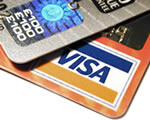 Go to main content
Go to main content
Archive Website of the UK government
Please note that this website has a UK government accesskeys system.
Main menu
Page menu
Money, tax and benefits

Debit cards and credit cards - the difference

When you buy goods or get cash with a debit card the money is taken from your bank account right away. With a credit card you get a monthly bill. If you don't repay the amount owed in full on a credit card, or if you take out cash, the charges are very high.
How debit cards work
Debit cards are linked directly to your bank account. You can use them to buy goods or withdraw cash and the amount is taken from your account right away.
You can also use debit cards to get 'cashback' from shops when you buy goods and also ask for money back from the cashier, although not all shops offer this. The total amount is deducted from your account right away.
When using a cash machine or paying for goods with a debit card you'll need to enter your PIN (personal identity number). When buying goods you usually enter it into an electronic hand held device, but in some cases you may have to sign.
Most bank accounts offer debit cards. Most debit cards double up as 'cheque guarantee cards', guaranteeing that your cheque will be honoured by your bank up to a stated amount.
What happens if there's not enough money in your account?
This will depend on the type of debit card you have:
- if you have a ‘Solo’ or ‘Electron’ debit card the balance in your account is checked before each transaction – if there’s not enough money you won’t be able pay or withdraw cash with the debit card without prior agreement
- if you have ‘Switch’, ‘Visa’ or ‘Delta’ card your account balance won’t necessarily be checked and the payment may still go through
If you go overdrawn the charges you’ll pay will depend on whether or not you have an authorised overdraft arrangement with your bank. If you do, you’ll pay the agreed amount of interest at the end of each month. This is usually much lower than interest charged on credit cards.
If you don’t have an overdraft agreement, or you exceed the agreed limit, your bank may allow the payment to go through but you’ll usually pay much higher fees than if you had an agreed overdraft.
Using a debt card over the phone or internet
Debit cards can be used to make payments by phone or over the internet. In this case you'll need to provide certain details that are printed on your card. Find out more and view an example debit card on the Financial Services Authority (FSA) website.
How credit cards work
A credit card is a form of borrowing. Firms lending money to customers must be licensed by the Office of Fair Trading (OFT) under The Consumer Credit Act 1974. The Act requires certain credit and hire agreements to be set out in a particular way and to contain relevant information for the person borrowing.
Credit cards allow you to 'buy goods now and pay later' - called 'buying on credit'. They aren't linked to your bank account. Like debit cards, they can be used to buy goods in shops over the telephone and internet, with the same details being required. You can also get a 'cash advance' by drawing money at bank cash machines.
Your bank may offer you a credit card, or you can apply for one to any institution offering one. The credit card provider will normally run checks to see if you've had problems repaying debts before offering you one (called a 'credit check').
The risks of using a credit card
Think carefully before using a credit card. If you don't repay your bill in full by the date shown you're charged interest on the whole amount of the bill for that month. The rates of interest - indicated by the APR (annual percentage rate) - can be very high indeed.
If you take cash out with a credit card you're charged daily interest from the moment you take out the cash until the credit card bill is paid in full. This is an expensive way of borrowing money.
Some credit cards also charge you an annual fee simply for having the card.
If you can't afford to repay your credit card bill you could quickly fall into debt. Find out more about what to look out for with credit cards in our related article below.
More useful links
Useful contacts
Additional links
Foreign-owned banks

Should a bank fail, compensation schemes protect your savings. But foreign-owned banks may be covered in other ways
 Facebook
Facebook Twitter
Twitter StumbleUpon
StumbleUpon Delicious
Delicious Reddit
Reddit
